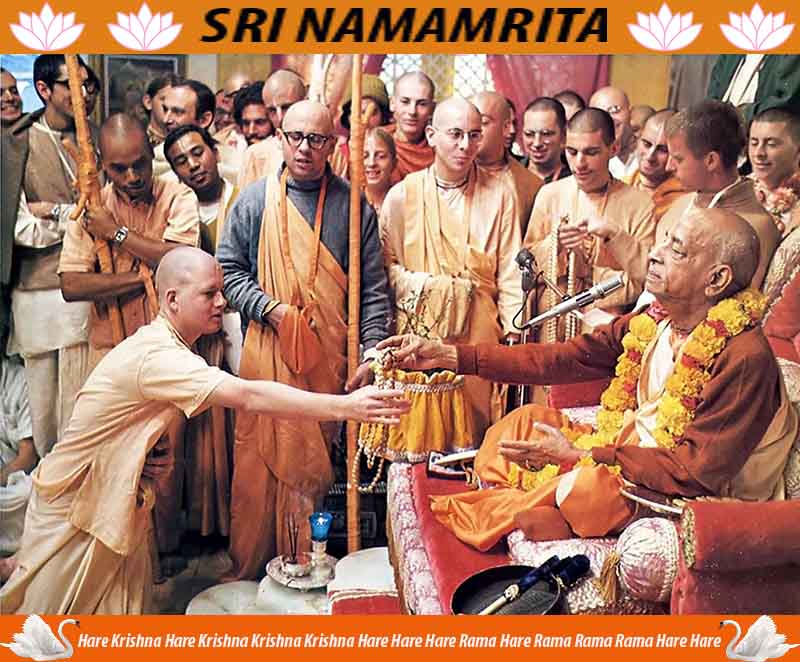
Chanting is more effective than the yoga system in this age: This material world has been likened to a great forest fire. As in the forest, fire may
automatically take place, so in this material world, although we may try to live peacefully, there is always a great conflagration. It is not possible to live in peace anywhere in the material world. But for one who is transcendentally situated−either by the meditational yoga system or by the empirical philosophical method or by bhakti−yoga−Peace is possible. All forms of yoga are meant for transcendental life, but the method of chanting is especially effective in this age. Kirtana may go on for hours, and one may not feel tired, but it is difficult to sit in lotus position perfectly still for more than a few minutes.
¯The Perfection of Yoga
Sri Namamrta:
Chanting the holy name is more suitable for spiritual realization in this age than yoga or meditation: In India the yogis, the transcendentalists or the devotees all leave home and reside in sacred places such as Prayaga, Mathura, Vrndavana, Hrsikesa, and Hardwar and in solitude practice yoga where the sacred rivers like the Yamuna and the Ganges flow. But often this is not possible, especially for Westerners. The so−called yoga societies in big cities may be successful in earning material benefit, but they are not at all suitable for the actual practice of yoga. One who is not self−controlled and whose mind is not undisturbed cannot practice meditation. Therefore, in the Brhan−naradiya Purana it is said that in the Kali−yuga (the present yuga or age) when people in general are short−lived, slow in spiritual realization and always disturbed by various anxieties, the best means of spiritual realization is chanting the holy name of the Lord.
harer nama harer nama
harer namaiva kevalam
kalau nasty eva nasty eva
nasty eva gatir anyatha
[Adi 17.21]
"In this age of quarrel and hypocrisy the only means of deliverance is chanting the holy name of the Lord. There is no other way. There is no other way. There is no other way."
¯Bhagavad−gita As It Is 6.11−12
Chanting the holy name is more important than mechanical, meditational yoga in this age: [Maitreya to Vidura]: By thus practicing severe austerities, Maharaja Prthu gradually became steadfast in spiritual life and completely free of all desires for fruitive activities. He also practiced breathing exercises to control his mind and senses, and by such control he became completely free from all desires for fruitive activity.
The word pranayamaih is very important in this verse because the hatha−yogis and astanga−yogis practice pranayama, but generally they do not know the purpose behind it. The purpose of pranayama, or mystic yoga, is to stop the mind and senses from engaging in fruitive activities. The so−called yogis who practice in Western countries have no idea of this. The aim of pranayama is not to make the body strong and fit for working hard. The Sri Namamrta:
aim is worship of Krsna. In the previous verse it was specifically mentioned that whatever austerity, pranayama and mystic yoga practices Prthu Maharaja performed were performed for the sake of worshiping Krsna. Thus Prthu Maharaja serves as a perfect example for yogis also. Whatever he did, he did to please the Supreme Personality of Godhead, Krsna. The minds of those who are addicted to fruitive activity are always filled with unclean desires. Fruitive activities are symptomatic of our polluted desire to dominate material nature. As long as one continues to be subject to polluted desires, he has to accept one material body after another. So−called yogis, without knowledge of the real purpose of yoga, practice it in order to keep the body fit. Thus they engage themselves in fruitive activities, and thus they are bound by desire to accept another body. They are not aware that the ultimate goal of life is to approach Krsna. In order to save such yogis from wandering throughout the different species of life, the sastras warn that in this age such yogic practice is simply a waste of time. The only means of elevation is the chanting of the Hare Krsna maha−mantra.
King Prthu's activities took place in Satya−yuga, and in this age this practice of yoga is misunderstood by fallen souls who are not capable of practicing anything. Consequently the sastras enjoin: kalau nasty eva nasty eva nasty eva gatir anyatha. The conclusion is that unless the karmis, jnanis and yogis come to the point of devotional service to Lord Krsna, their so−called austerities and yoga have no value. Naradhitah: if Hari, the Supreme Personality of Godhead, is not worshiped, there is no point in practicing meditational yoga, performing karma−yoga or culturing empiric knowledge. As far as pranayama is concerned, chanting of the holy name of the Lord and dancing in ecstasy are also considered pranayama... Here the word pranayama does not refer to any ulterior motive. The actual aim is to strengthen the mind and senses in order to engage them in devotional service. In the present age this determination can be very easily acquired simply by chanting the holy
names−Hare Krsna, Hare Krsna, Krsna Krsna, Hare Hare/ Hare Rama, Hare Rama, Rama Rama, Hare Hare.
¯Srimad−Bhagavatam 4.23.8

